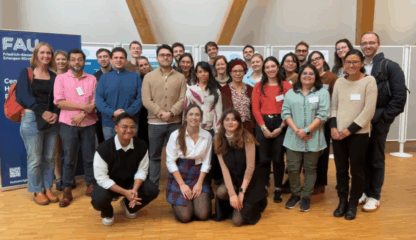On September 29 and 30, we welcomed over 30 researchers from various countries to our International Workshop 2025 – Business, Human Rights, and the Environment in Andean Countries. The workshop was jointly organized by the Centre for Human Rights Erlangen-Nuremberg (CHREN) and the ADLAF Working Group on Andean Countries, with the aim of fostering exchange and building new alliances among researchers, activists, company representatives and social movements committed to socio-environmental justice and strengthening corporate accountability. The participants were warmly received at the Centre for Human Rights Erlangen-Nuremberg (CHREN), in Nuremberg.
Over the course of two days, we engaged in dynamic discussions on the diverse social and environmental impacts of business activities in the Andean region, framed within the broader context of our global (political) economy.
Across four sessions, participants presented research findings, preliminary fieldwork results, and future project proposals focused on the Andean region. Topics included mining, environmental justice and sustainable transformation, agriculture, corporate responsibility, and the challenges posed by so-called green extractivism and critical raw materials.
As part of the research project “Corporate Accountability in Global Supply Chains”, scholars Maria-Therese Gustafsson and Julia Stefanello Pires presented on “Human Rights and Environmental Due Diligence in Critical Raw Material Supply Chains: A Comparative Study of Argentina, Brazil, Chile, and Peru”, during Session 4: Challenges Surrounding Green Extractivism and Critical Raw Materials on the second day of the event. They shared insights from our ongoing work and outlined plans for upcoming fieldwork and workshops.
After two intense days of discussion, it became clear that the Andean region is increasingly central to the global race for critical minerals and other extractive sectors. As these activities expand, so do their socio-environmental impacts, demanding greater attention and calling urgently for social and environmental justice across the region and in global supply chains.

